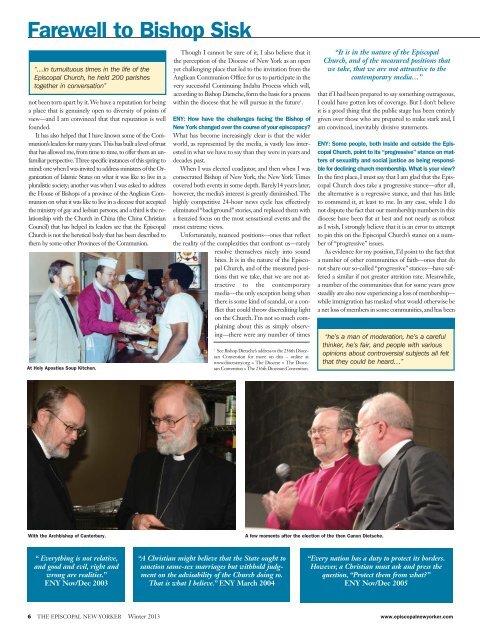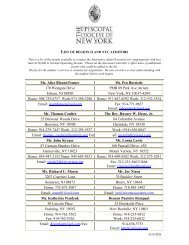Farewell to Bishop Sisk - Episcopal Diocese of New York
Farewell to Bishop Sisk - Episcopal Diocese of New York
Farewell to Bishop Sisk - Episcopal Diocese of New York
Create successful ePaper yourself
Turn your PDF publications into a flip-book with our unique Google optimized e-Paper software.
<strong>Farewell</strong> <strong>to</strong> <strong>Bishop</strong> <strong>Sisk</strong><br />
“…in tumultuous times in the life <strong>of</strong> the<br />
<strong>Episcopal</strong> Church, he held 200 parishes<br />
<strong>to</strong>gether in conversation”<br />
not been <strong>to</strong>rn apart by it. We have a reputation for being<br />
a place that is genuinely open <strong>to</strong> diversity <strong>of</strong> points <strong>of</strong><br />
view—and I am convinced that that reputation is well<br />
founded.<br />
It has also helped that I have known some <strong>of</strong> the Communion’s<br />
leaders for many years. This has built a level <strong>of</strong> trust<br />
that has allowed me, from time <strong>to</strong> time, <strong>to</strong> <strong>of</strong>fer them an unfamiliar<br />
perspective. Three specific instances <strong>of</strong> this spring <strong>to</strong><br />
mind: one when I was invited <strong>to</strong> address ministers <strong>of</strong> the Organization<br />
<strong>of</strong> Islamic States on what it was like <strong>to</strong> live in a<br />
pluralistic society; another was when I was asked <strong>to</strong> address<br />
the House <strong>of</strong> <strong>Bishop</strong>s <strong>of</strong> a province <strong>of</strong> the Anglican Communion<br />
on what it was like <strong>to</strong> live in a diocese that accepted<br />
the ministry <strong>of</strong> gay and lesbian persons; and a third is the relationship<br />
with the Church in China (the China Christian<br />
Council) that has helped its leaders see that the <strong>Episcopal</strong><br />
Church is not the heretical body that has been described <strong>to</strong><br />
them by some other Provinces <strong>of</strong> the Communion.<br />
At Holy Apostles Soup Kitchen.<br />
“ Everything is not relative,<br />
and good and evil, right and<br />
wrong are realities.”<br />
ENY Nov/Dec 2003<br />
Though I cannot be sure <strong>of</strong> it, I also believe that it<br />
the perception <strong>of</strong> the <strong>Diocese</strong> <strong>of</strong> <strong>New</strong> <strong>York</strong> as an open<br />
yet challenging place that led <strong>to</strong> the invitation from the<br />
Anglican Communion Office for us <strong>to</strong> participate in the<br />
very successful Continuing Indaba Process which will,<br />
according <strong>to</strong> <strong>Bishop</strong> Dietsche, form the basis for a process<br />
within the diocese that he will pursue in the future 1 .<br />
ENY: How have the challenges facing the <strong>Bishop</strong> <strong>of</strong><br />
<strong>New</strong> <strong>York</strong> changed over the course <strong>of</strong> your episcopacy?<br />
What has become increasingly clear is that the wider<br />
world, as represented by the media, is vastly less interested<br />
in what we have <strong>to</strong> say than they were in years and<br />
decades past.<br />
When I was elected coadju<strong>to</strong>r, and then when I was<br />
consecrated <strong>Bishop</strong> <strong>of</strong> <strong>New</strong> <strong>York</strong>, the <strong>New</strong> <strong>York</strong> Times<br />
covered both events in some depth. Barely14 years later,<br />
however, the media’s interest is greatly diminished. The<br />
highly competitive 24-hour news cycle has effectively<br />
eliminated “background” s<strong>to</strong>ries, and replaced them with<br />
a frenzied focus on the most sensational events and the<br />
most extreme views.<br />
Unfortunately, nuanced positions—ones that reflect<br />
the reality <strong>of</strong> the complexities that confront us—rarely<br />
resolve themselves nicely in<strong>to</strong> sound<br />
bites. It is in the nature <strong>of</strong> the <strong>Episcopal</strong><br />
Church, and <strong>of</strong> the measured positions<br />
that we take, that we are not attractive<br />
<strong>to</strong> the contemporary<br />
media—the only exception being when<br />
there is some kind <strong>of</strong> scandal, or a conflict<br />
that could throw discrediting light<br />
on the Church. I’m not so much complaining<br />
about this as simply observing—there<br />
were any number <strong>of</strong> times<br />
1 See <strong>Bishop</strong> Dietsche’s address <strong>to</strong> the 236th Diocesan<br />
Convention for more on this – online at<br />
www.dioceseny.org > The <strong>Diocese</strong> > The Diocesan<br />
Convention > The 236th Diocesan Convention.<br />
With the Archbishop <strong>of</strong> Canterbury. A few moments after the election <strong>of</strong> the then Canon Dietsche.<br />
“A Christian might believe that the State ought <strong>to</strong><br />
sanction same-sex marriages but withhold judgment<br />
on the advisability <strong>of</strong> the Church doing so.<br />
That is what I believe.” ENY March 2004<br />
“It is in the nature <strong>of</strong> the <strong>Episcopal</strong><br />
Church, and <strong>of</strong> the measured positions that<br />
we take, that we are not attractive <strong>to</strong> the<br />
contemporary media…”<br />
that if I had been prepared <strong>to</strong> say something outrageous,<br />
I could have gotten lots <strong>of</strong> coverage. But I don’t believe<br />
it is a good thing that the public stage has been entirely<br />
given over those who are prepared <strong>to</strong> make stark and, I<br />
am convinced, inevitably divisive statements.<br />
ENY: Some people, both inside and outside the <strong>Episcopal</strong><br />
Church, point <strong>to</strong> its “progressive” stance on matters<br />
<strong>of</strong> sexuality and social justice as being responsible<br />
for declining church membership. What is your view?<br />
In the first place, I must say that I am glad that the <strong>Episcopal</strong><br />
Church does take a progressive stance—after all,<br />
the alternative is a regressive stance, and that has little<br />
<strong>to</strong> commend it, at least <strong>to</strong> me. In any case, while I do<br />
not dispute the fact that our membership numbers in this<br />
diocese have been flat at best and not nearly as robust<br />
as I wish, I strongly believe that it is an error <strong>to</strong> attempt<br />
<strong>to</strong> pin this on the <strong>Episcopal</strong> Church’s stance on a number<br />
<strong>of</strong> “progressive” issues.<br />
As evidence for my position, I’d point <strong>to</strong> the fact that<br />
a number <strong>of</strong> other communities <strong>of</strong> faith—ones that do<br />
not share our so-called “progressive” stances—have suffered<br />
a similar if not greater attrition rate. Meanwhile,<br />
a number <strong>of</strong> the communities that for some years grew<br />
steadily are also now experiencing a loss <strong>of</strong> membership—<br />
while immigration has masked what would otherwise be<br />
a net loss <strong>of</strong> members in some communities, and has been<br />
“he’s a man <strong>of</strong> moderation, he’s a careful<br />
thinker, he’s fair, and people with various<br />
opinions about controversial subjects all felt<br />
that they could be heard…”<br />
“Every nation has a duty <strong>to</strong> protect its borders.<br />
However, a Christian must ask and press the<br />
question, “Protect them from what?”<br />
ENY Nov/Dec 2005<br />
6 THE EPISCOPAL NEW YORKER Winter 2013 www.episcopalnewyorker.com



